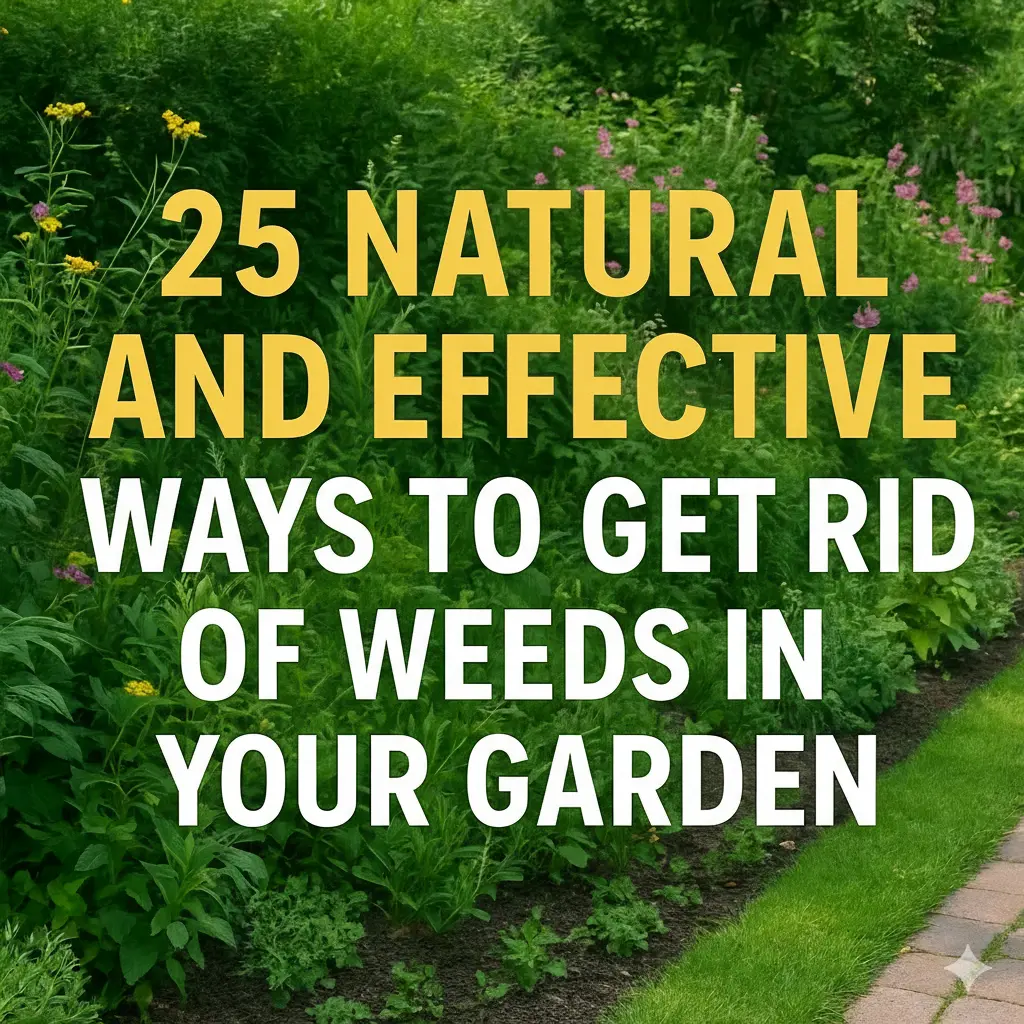Weeds are every gardener’s uninvited guests. No matter how carefully you plant or how often you tend your beds, those stubborn little intruders always seem to show up. The good news is that you don’t need harsh chemicals or expensive solutions to keep them under control. With a few natural and effective strategies, you can reclaim your garden, protect your soil, and even save time. Think of it as working with nature rather than against it.
1. Pulling Weeds by Hand
The simplest method is often the most effective—just pulling weeds out by hand. It works best when the soil is moist, like after watering or rain, because the roots come out more easily. I usually keep a small bucket handy and make it a quick five-minute task every morning. It’s surprising how much you can clear without it feeling overwhelming.
2. Smothering with Mulch
Mulch acts like a natural blanket that blocks sunlight and keeps weeds from growing. Spreading a layer of wood chips, straw, or even shredded leaves around your plants can make a huge difference. I once used grass clippings from mowing the lawn, and it not only reduced weeds but also fed the soil as it broke down.
3. Boiling Water Treatment
Pouring boiling water directly on weeds is an easy, chemical-free solution. It destroys the plant instantly, especially for weeds growing in cracks of patios or driveways. I’ve done this after making pasta—just carrying the leftover hot water outside and pouring it on stubborn weeds. Quick and waste-free.
4. Vinegar Spray
Vinegar’s acidity makes it tough on weeds. You can pour it into a spray bottle and target weeds on sunny days for the best results. I tried this on weeds near my garden path, and within a couple of days they turned brown and shriveled. Just be careful not to spray your actual plants, as vinegar doesn’t discriminate.
5. Planting Ground Covers
Filling your garden beds with ground-cover plants can choke out weeds naturally. Plants like clover, thyme, or creeping phlox spread quickly and leave little room for unwanted weeds. I planted creeping thyme around my stepping stones, and not only did it keep weeds away, but it also gave off a lovely scent every time I walked on it.
6. Cornmeal as a Pre-Emergent
Cornmeal doesn’t kill existing weeds, but it stops new seeds from sprouting. If you spread it around your garden beds, it acts as a natural barrier to weed growth. I once tried it in a small patch where I kept planting herbs, and it helped reduce the endless sprouting of random weeds.
7. Solarization with Plastic Sheets
This method uses the sun’s heat to kill weeds and their seeds. Simply cover a weedy area with clear plastic for several weeks, letting the sun bake the soil. It feels like giving your garden a fresh start—I did this before planting tomatoes, and the bed stayed much cleaner afterward.
8. Salt Water Solution
Mixing salt with water can dry out weeds and prevent regrowth. This works especially well on weeds growing in driveways or walkways. I used it once between the cracks of my patio stones, and it kept weeds away for months. Just avoid using it in garden beds, since salt can harm the soil.
9. Hoeing and Cultivating
Using a hoe to slice weeds just below the soil surface is a time-tested method. It’s fast, especially if you tackle them when they’re still young seedlings. I often grab my hoe after a light rain—it glides through the soil, and the weeds pop right out.
10. Maintaining Healthy Soil
The healthier your soil, the less room there is for weeds to thrive. Adding compost and keeping the soil rich with organic matter makes it harder for weeds to take over. I noticed after a season of regularly composting, my plants grew stronger while weeds struggled to compete.
11. Hot Soap Spray
Mixing a little dish soap with hot water creates a simple spray that clings to weeds and helps dehydrate them. It’s especially effective on small, tender weeds. I’ve used it on weeds in flower beds, and it worked without harming the soil.
12. Newspaper or Cardboard Layers
Laying down newspaper or cardboard under mulch creates a strong barrier that smothers weeds. Over time, it breaks down and enriches the soil. I once lined my vegetable garden with cardboard boxes from deliveries, and it kept weeds down all season.
13. Flame Weeding
A flame weeder uses a small torch to scorch weeds without chemicals. A quick pass of heat makes them wilt and die within days. I tried it along my gravel driveway, and it was oddly satisfying to watch the weeds sizzle.
14. Frequent Mowing
For lawn weeds, mowing regularly keeps them from flowering and spreading seeds. It doesn’t remove them instantly, but over time, it weakens their cycle. I noticed that dandelions in my yard almost disappeared when I kept up with consistent mowing.
15. Watering Only Where Needed
Weeds thrive when water is spread everywhere. By using drip irrigation or watering just the base of your plants, you starve weeds of the moisture they need. I switched to a simple drip hose, and the bare soil between plants stayed weed-free.
16. Companion Planting
Growing certain plants together can naturally reduce weeds. Tall or spreading crops like squash or beans shade the soil and block weeds from getting enough light. I planted bushy zucchini once, and it left barely any space for weeds to sneak in.
17. Repeated Cutting Back
If you keep cutting a weed down every time it sprouts, eventually it loses its energy reserves and dies. It’s a bit of persistence, but it works. I had a patch of thistles, and after trimming them down weekly, they finally gave up.
18. Using Natural Ground Barriers
Rocks, gravel, or wood chips spread thickly can prevent weeds from breaking through in walkways and borders. I created a gravel path in my backyard, and weeds barely managed to poke through after that.
19. Letting Chickens Help
If you have space, chickens can be excellent little weed removers. They scratch the soil, eat the weeds, and even fertilize while they’re at it. I once borrowed a neighbor’s hens for a week, and my garden beds looked freshly tilled afterward.
20. Timing Your Weeding
Weeds are easiest to control when they’re young and haven’t gone to seed yet. Making it a habit to weed just before they flower saves you a lot of trouble later. I found that a quick weekend check kept my garden far more manageable.
21. Pouring Baking Soda
Sprinkling baking soda in cracks and pathways makes it harder for weeds to grow back. It changes the surface conditions so weeds can’t thrive. I tried this on my front walkway, and it kept the tiny weeds from returning for weeks.
22. Strong Jet of Water
Sometimes a powerful spray from the hose can loosen young weeds and wash them right out of the soil. It works best for shallow-rooted weeds. I’ve used this trick after watering my herbs, and it made pulling the little weeds much easier.
23. Harvesting Weeds for Compost
Instead of tossing weeds, you can compost them—just avoid ones with seeds. This way, you’re turning a problem into free fertilizer. I often add pulled weeds to my compost pile, and months later, they return as rich soil for my plants.
24. Densely Planting Crops
Crowding your garden beds with vegetables, herbs, or flowers leaves less space for weeds. The thick canopy shades the soil and blocks new growth. I once planted lettuce close together, and it was amazing how weed-free that bed stayed.
25. Regular Mulch Refresh
Even the best mulch thins out over time, and weeds find their way through. Adding a fresh layer once or twice a season keeps the barrier strong. I refreshed mine with shredded leaves last fall, and the beds looked tidy and weed-free all spring.
Getting rid of weeds doesn’t have to be a constant battle. By using simple, natural methods, you can keep them in check while still maintaining a healthy, thriving garden. Whether it’s pulling them by hand, mulching, or trying clever tricks like vinegar spray or ground covers, each approach adds up to a cleaner and more enjoyable outdoor space. The best part is that these techniques are safe, sustainable, and often surprisingly easy to do. With consistency, your garden can stay the peaceful, productive place you want it to be.


